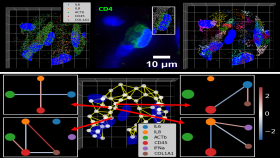The National Cancer Institute (NCI) has awarded Melissa Kemp, associate professor in the Wallace H. Coulter Department of Biomedical Engineering at Georgia Tech and Emory, and a multidisciplinary team of researchers a five year, $3.2 million grant.
The researchers aim to identify metabolic features in head and neck cancers that are predictive of tumor response to a new chemotherapeutic drug, ß-lapachone, currently in clinical trial at the University of Texas-Southwestern (UTSW). Fellow leaders of the project are David Boothman, Ph.D., from the UTSW Medical Center and Cristina Furdui, Ph.D., from the Wake Forest School of Medicine.
Joshua Lewis, an Emory M.D./BME Bioinformatics Ph.D. student in Kemp’s lab, developed a genome-wide model of metabolism in head and neck cancer that explained why the cytotoxicity to ß-lapachone differed between radiation-sensitive and radiation-resistant cancer cells.
The research team identified new molecular targets for enhancing cell death with the drug—validating the results with a 332 gene RNAi screen. The modeling analysis suggests that the radiation-resistant cells rerouted metabolism and altered the enzymatic cycling of ß-lapachone, rendering them more susceptible to the chemotherapy.
“I’ve learned through this project how devastating head and neck cancer (HNC) is for patients, and the incidence of HNC is particularly high here in the Southeast compared to the rest of the US,” said Kemp, a researcher with the Petit Institute for Bioengineering and Bioscience at Georgia Tech.
“There are very few FDA-approved drugs for HNC and the survival rate for the late-stage cancer patients we are examining has been relatively stagnant for the past three decades," Kemp added. “Our goals are to develop computational models that factor in patient-to-patient variability in HNC metabolism and use these tools to predict who will respond well to the new ß-lapachone therapies.”
Head and neck cancers include cancers of the larynx (voice box), throat, lips, mouth, nose, and salivary glands.
As part of the award, the researchers will join and participate in the NCI Cancer Systems Biology Consortium. The multidisciplinary Cancer Systems Biology Consortium, funded by the National Cancer Institute, aims to tackle the most perplexing issues in cancer to increase our understanding of tumor biology, treatment options, and patient outcomes.
Media Contact:
Walter Rich
Communications Manager
Wallace H. Coulter Department of Biomedical Engineering
Media Contact
Walter Rich
Keywords
Latest BME News
Commercialization program in Coulter BME announces project teams who will receive support to get their research to market.
Courses in the Wallace H. Coulter Department of Biomedical Engineering are being reformatted to incorporate AI and machine learning so students are prepared for a data-driven biotech sector.
Influenced by her mother's journey in engineering, Sriya Surapaneni hopes to inspire other young women in the field.
Coulter BME Professor Earns Tenure, Eyes Future of Innovation in Health and Medicine
The grant will fund the development of cutting-edge technology that could detect colorectal cancer through a simple breath test
The surgical support device landed Coulter BME its 4th consecutive win for the College of Engineering competition.
New research from Georgia Tech helps doctors predict how therapies will interact with a child's immune system, potentially improving outcomes and reducing risks.








